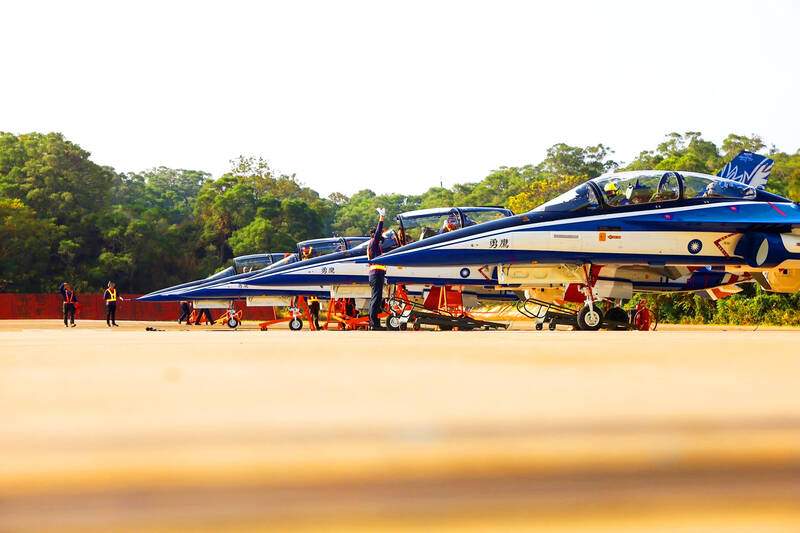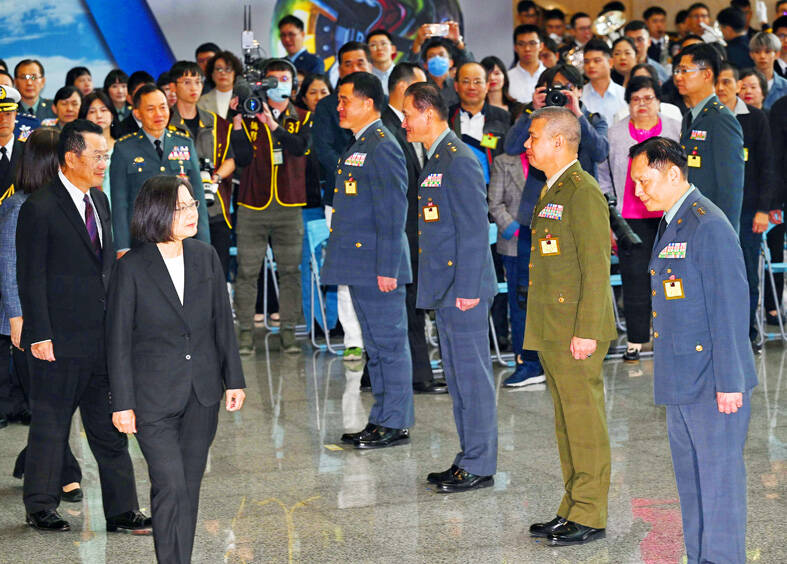President Tsai Ing-wen (蔡英文) yesterday at a ceremony to promote 26 senior military officers touted her administration’s efforts in developing indigenous weapon systems during her nearly eight years in office.
At the ceremony at the Ministry of National Defense’s Taipei headquarters — the last Tsai attended before her second four-year term ends in May next year — she said she had launched several military reforms to boost the armed forces’ readiness.
Such efforts include building warplanes and warships at home, such as Taiwan’s first indigenous defense submarine the Hai Kun (海鯤), or “Narwhal,” and bolstering the military’s combat readiness and resilience, she said.

Photo: CNA
Tsai also thanked the promoted officers for their tireless efforts, and urged them to continue to exercise their leadership in their new roles.
The promotion of senior military personnel used to be carried out twice a year, but is now done at monthly events after the legislature revised the law in May last year.
However, the conferral ceremony is still held twice a year — in June and in December.

Photo: Chang Chia-ming, Taipei Times
Seven officers were yesterday promoted to the rank of two-star general — either lieutenant general or admiral — and 19 were promoted to one-star generals — either major general or vice admiral.
Among the seven new two-star generals was former military spokesman Major General Shih Shun-wen (史順文), who heads the Army Command Headquarters’ Political Warfare Department.
A graduate of Fu Hsing Kang College’s class of 1990, he previously served as a news section chief at the Army Command Headquarters and was political warfare head in Kinmen County.
Separately, Aerospace Industrial Development Corp (AIDC, 漢翔航空工業) yesterday delivered four trainer aircraft — the last four of seven scheduled for delivery this year — to the air force.
The “Brave Eagle” planes were showcased at a press event at AIDC’s manufacturing hub in Taichung and conducted a flyover there before heading to Chihang Air Base in Taitung County.
The Brave Eagle is an advanced jet trainer that is to gradually replace the military’s F-5E/F jets and AT-3 jet trainers.
The government ordered 66 of the advanced trainer aircraft from AIDC in 2017, to be delivered by 2026.
Seventeen were to be delivered by the end of this year. Two were delivered in 2021, eight were delivered last year and three had been delivered earlier this year.
There had been concerns that the last four would not be handed over in time, but the delivery was made with 19 days left to spare.
AIDC president Ma Wan-june (馬萬鈞) said it has been challenging to manufacture the planes, as the supply chain was cut off due to the COVID-19 pandemic, and it was not until Nov. 20 that they had enough key materials to assemble the planes.
AIDC workers then spent day and night manufacturing the planes before conducting ground tests, Ma said.
Meanwhile, the air force’s Project Feng Chan (鳳展) to upgrade its 141 F-16A/B jets to match F-16Vs in capability is expected to conclude on Thursday next week, military sources said yesterday.
The project — a collaboration between AIDC and Lockheed-Martin Corp of the US — was launched in 2018.
The air force separately purchased 66 Block 70 F-16Vs from the US under Project Feng Hsiang (鳳翔), the source said.
The Ministry of National Defense’s budget for next year showed that NT$140.2 billion (US$4.45 billion) has been allocated to the project, which was expected to conclude by the end of this month, the source said.
A separate project involving munitions upgrades is expected to be completed by next year, they added.
Tests on the last upgraded jet were completed on Dec. 3, the source said, adding that AIDC and Lockheed-Martin needed to complete final preparations, but no more flight tests are planned.

STILL COMMITTED: The US opposes any forced change to the ‘status quo’ in the Strait, but also does not seek conflict, US Secretary of State Marco Rubio said US President Donald Trump’s administration released US$5.3 billion in previously frozen foreign aid, including US$870 million in security exemptions for programs in Taiwan, a list of exemptions reviewed by Reuters showed. Trump ordered a 90-day pause on foreign aid shortly after taking office on Jan. 20, halting funding for everything from programs that fight starvation and deadly diseases to providing shelters for millions of displaced people across the globe. US Secretary of State Marco Rubio, who has said that all foreign assistance must align with Trump’s “America First” priorities, issued waivers late last month on military aid to Israel and Egypt, the

‘UNITED FRONT’ FRONTS: Barring contact with Huaqiao and Jinan universities is needed to stop China targeting Taiwanese students, the education minister said Taiwan has blacklisted two Chinese universities from conducting academic exchange programs in the nation after reports that the institutes are arms of Beijing’s United Front Work Department, Minister of Education Cheng Ying-yao (鄭英耀) said in an exclusive interview with the Chinese-language Liberty Times (the Taipei Times’ sister paper) published yesterday. China’s Huaqiao University in Xiamen and Quanzhou, as well as Jinan University in Guangzhou, which have 600 and 1,500 Taiwanese on their rolls respectively, are under direct control of the Chinese government’s political warfare branch, Cheng said, citing reports by national security officials. A comprehensive ban on Taiwanese institutions collaborating or

France’s nuclear-powered aircraft carrier and accompanying warships were in the Philippines yesterday after holding combat drills with Philippine forces in the disputed South China Sea in a show of firepower that would likely antagonize China. The Charles de Gaulle on Friday docked at Subic Bay, a former US naval base northwest of Manila, for a break after more than two months of deployment in the Indo-Pacific region. The French carrier engaged with security allies for contingency readiness and to promote regional security, including with Philippine forces, navy ships and fighter jets. They held anti-submarine warfare drills and aerial combat training on Friday in

COMBAT READINESS: The military is reviewing weaponry, personnel resources, and mobilization and recovery forces to adjust defense strategies, the defense minister said The military has released a photograph of Minister of National Defense Wellington Koo (顧立雄) appearing to sit beside a US general during the annual Han Kuang military exercises on Friday last week in a historic first. In the photo, Koo, who was presiding over the drills with high-level officers, appears to be sitting next to US Marine Corps Major General Jay Bargeron, the director of strategic planning and policy of the US Indo-Pacific Command, although only Bargeron’s name tag is visible in the seat as “J5 Maj General.” It is the first time the military has released a photo of an active